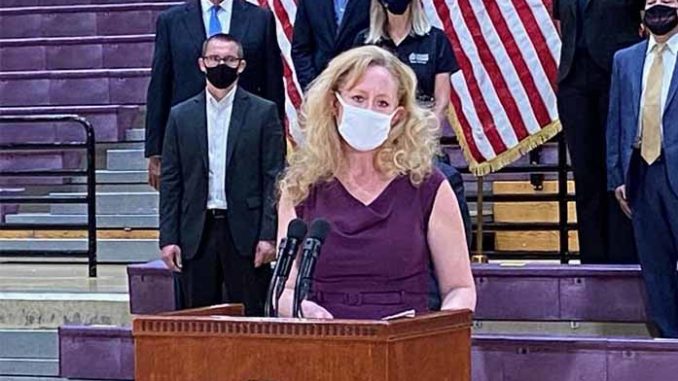
The attorney for dozens of bars and saloons across Arizona who insist they are facing “imminent economic disaster” due to Gov. Doug Ducey’s various COVID19 related executive orders hoped the state’s top public health official would give his clients some hope Thursday that business will return to normal sooner than later.
Instead, attorney Ilan Wurman heard testimony from Dr. Cara Christ that there is no light at the end of the tunnel, at least no time soon, and that Christ, the director of the Arizona Department of Health Services, has no idea when or under what conditions she would recommend changes to Ducey’s Executive Order 2020-43 which places particularly severe restrictions on bars and saloons which operate with a Series 6 or Series 7 liquor license.
RELATED ARTICLE: Number Of Hospitalized COVID-19 Cases In Arizona Has Decreased By 2,815
More than 100 owners of such licenses sued Ducey this summer in Maricopa County Superior Court in an attempt to overturn the executive order. They claim the governor overstepped his authority by imposing restrictions on their operations while other liquor license holders, particularly restaurants, are able to be open.
Ducey has even allowed restaurants to sell alcohol on a to-go or off-sale basis, something which by law only Series 6 & 7 establishments are allowed to do. Last month Judge Pamela Gates denied a motion filed by Wurman for an injunction against the governor’s order and the Arizona Supreme Court declined to get involved at this point.
But the case is continuing in hopes of some other form of relief with Ducey, the Arizona Department of Liquor Licenses & Control (ADLLC), and the Arizona Department of Health Services (ADHS) as defendants. The parties will be back in Gates’ courtroom -some telephonically- for oral arguments in the case on Oct. 16.
Among the highlights of Christ’s testimony on Thursday was her continued support of a claim Ducey made several weeks ago of a presumed “significantly higher” risk of infection via bars and saloons compared to restaurants. This is due, she said, to the fact patrons of such establishments would likely be “putting more virus” into the air.
“Alcohol does tend to affect one’s ability to physically distance and make good decisions,” Christ told Gates, adding that people are more likely to “lean in and get closer to individuals when they are talking” at bars because it’s louder compared to restaurants.
On the stand, Christ also acknowledged she had no knowledge of any COVID-19 infections being tracked back to a specific Series 6 or 7 business. But she insisted now is not the right time to recommend major changes to the executive order, even though she couldn’t offer specifics as to how she would gauge the right time.
“That’s hard to predict now because we learn new things every day,” Christ testified. “The public health emergency is really protecting our health care system, making sure we keep as few people from getting sick or dying and having access to those resources than it is just eradicating the disease.”
In the meantime, Wurman put the state and its agencies on notice last month that he is seeking $12.5 million for his clients to settle their financial claims stemming from Ducey’s actions. If the state rejects the demand, then Wurman plans to amend the current lawsuit to include additional claims.

